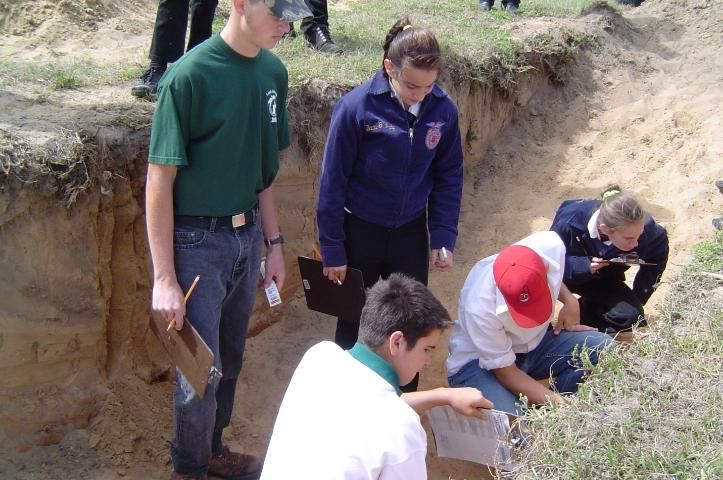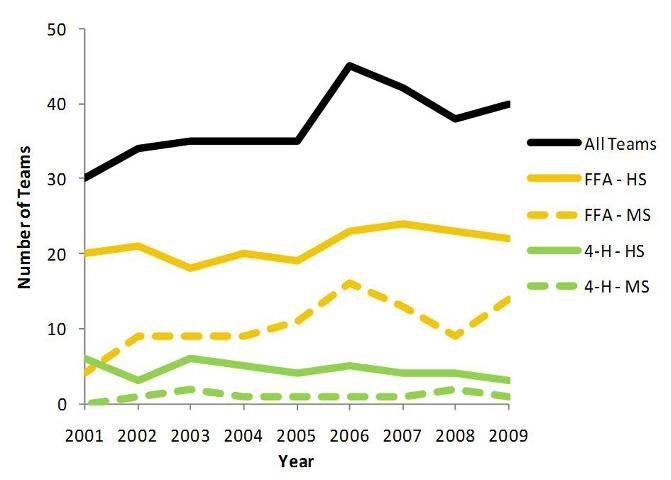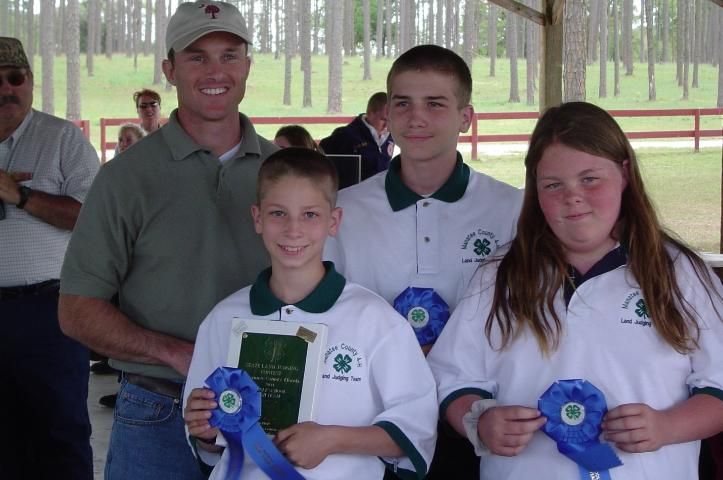Introduction and Purpose
Students participating in land judging learn to understand soil and water systems in a much broader sense than only learning to describe soils. Students who participate in land judging learn how to make informed decisions about overall land use. In fact, students learn how to make the types of land-use decisions that land managers in our communities make on a daily basis. Proper land-use decisions ensure the best use of our soil and water resources and reduce stress on the environment. In addition to gaining knowledge about soils and land-use attributes, students who participate in land judging have the opportunity to develop statewide leadership and citizenship skills.
This publication provides a description of the learning experience and related practical applications when youth participate in land judging activities. This document also outlines the statewide involvement generated by the Florida Land Judging program. The overall goals of this publication are to increase youth and leader excitement about soils and to increase participation of 4-H land judging teams in the Florida 4-H/FFA Land Judging Contest.
Description of the Skills Learned in Land Judging
When participating in the land judging program, students are asked to observe soil in the context of the surrounding landscape. Observation of various site characteristics involves investigation of vertical soil profiles at the site (Figure 1), which allows students to integrate information about the soil profile and apply it to the landscape. The intent of this exercise is to use the information to decide on appropriate land use and alternative site uses. In land judging, students determine the following site characteristics:
Site characteristics determined directly from soil/land observations
- Surface texture.
- Organic matter (OM) content of the topsoil.
- Thickness of rooting zone.
- Movement of air and water in the soil (permeability).
- Slope.
- Erosion - wind and water.
- Drainage.
Site characteristics determined from characteristics 1 through 7
8. Factors determining land class.
9. Land capability class.
Soil classification designation (based on presence of clay and other characteristics)
10. Soil order.
More detailed information about these specific soil characteristics and their determination can be found in the Florida Land Judging manual. The most current version of the manual is available at http://landjudging.ifas.ufl.edu.

Credit: L. Rex Ellis, UF/IFAS
Land Judging and Environmental Quality
Some of the fundamental concepts that students learn when participating in land judging contests are directly related to environmental protection. When land-use decisions are made without using proper land judging skills, the results can be devastating to the environment. If land is used without considering soil and landscape characteristics, problems such as erosion, septic system failure, and excessive use of fertilizers or irrigation water can occur and will directly contribute to degradation of surface and ground water quality. For example, consider the effects of improper placement of a septic system. Failing septic systems can lead to nutrients (especially nitrogen) entering our springs and estuaries, which is already a major concern.
Students participating in land judging learn which soil and site characteristics should be considered before a specific land use is recommended. Participants gain a greater understanding of conservation practices that can protect soil from erosion (a leading cause of stream sedimentation and turbidity) and loss of organic matter (which functions to sequester carbon and hold water and nutrients in the soil). Participants also learn how to properly use fertilizers and soil amendments to improve crop quality, while also reducing the potential for water quality degradation by preventing nutrients from running off or leaching (moving downward through the soil profile with rainfall) from the site.
Understanding the components of both soil and site characteristics gives students the ability to rate the suitability of land for agricultural and non-agricultural uses, including septic systems, recreational land, and home lawns and landscapes. Ultimately, land judging activities help students become better stewards of the land. Informed land managers are beneficial for agriculture, conservation, environmental protection, and public health.
Students who participate in land judging training and contests learn to appreciate the importance of maintaining good soil and water quality and gain a greater understanding of the environmental costs of poor land-use decisions. They also develop an understanding of the broad positive impacts of wise land-use decisions. In addition, students gain leadership and social skills when they learn to work as part of a land judging team. Best of all, students love participating in land judging!
About the Local and Florida 4-H/FFA Land Judging Contests
The Florida 4-H/FFA Land Judging Contest is steeped in a tradition of enthusiastic participation, challenging science, and dynamic field conditions. For more than 50 years, middle and high school student teams from both 4-H and FFA have participated in this annual contest, which is usually held in March. The goals of the state contest are to stimulate interest in soils, to communicate the importance of conserving the land, and to build student confidence. These goals are accomplished by allowing students to observe soil profiles in their natural setting at four different landscape positions and then asking students to determine soil conditions at these locations in order to make informed land-use recommendations.
At the state level, land judging training and the annual state contest are coordinated by the State Land Judging Committee. The State Land Judging Committee includes members from the following organizations:
- Office of Agricultural Water Policy, FDACS
- Association of Florida Conservation Districts
- Soil and Water Conservation Council, FDACS
- Florida FFA Association, Inc.
- Natural Resources Conservation Service, USDA
- Institute of Food and Agricultural Sciences, University of Florida
- Florida Chapter, Soil and Water Conservation Society
Teams become eligible to participate in the Florida 4-H/FFA Land Judging Contest by winning local land judging contests in one of the following levels:
- Middle School 4-H
- Middle School FFA
- High School 4-H
- High School FFA
Local contests are organized by Soil and Water Conservation District (SWCD) boards. It is common for local SWCD boards to have multi-county contests or to forward local teams to neighboring contests if resources are limited. Teams entered in multi-county or regional contests will compete only against other teams from the same county that are at the same level.
Each Florida county can enter one winning team from each of the levels in the Florida 4-H/FFA Land Judging Contest. If a county has only one team at a given level, the team will be permitted to go directly to the state contest provided the team participates in a local contest in another county. Therefore, it is important for schools to communicate with local SWCD boards to avoid confusion and disappointment. The county winners are determined by the local SWCD board.
The location for the Florida 4-H/FFA Land Judging Contest changes annually. Attempts are made to rotate the contest to all areas of the state, and it is always hosted by SWCD boards. Current program details as well as examples from past land judging contests can be found at http://landjudging.ifas.ufl.edu. Winners of the Florida 4-H/FFA Land Judging Contest continue on to participate in the National Land Judging Contest, which is usually held in the late spring.
Opportunities for 4-H Student Involvement in Land Judging
In recent years, participation in the Florida 4-H/FFA Land Judging Contest has been dominated by Florida FFA teams (Figure 2). Because student teams only compete with other teams in their division, there is currently a good opportunity for 4-H students interested in competing at the state level. Novice 4-H land judging teams often go on to compete at the state contest in their first year because in many counties, there are no other 4-H teams participating in land judging. The team only needs to attend a neighboring local contest, document their participation at the local level, and then register for the state contest. In addition, 4-H teams new to the contest will likely place high in their division and receive recognition during the on-site awards ceremony at the state contest (Figure 3). Top placing teams are eligible to travel to the National Land Judging Contest in Oklahoma. The first place team is sponsored by Florida 4-H.


Credit: L. Rex Ellis, UF/IFAS
A past deterrent to 4-H participation in land judging has been the technical nature of the training material and the learning curve associated with training novice teams. However, recent activities by state faculty and Extension specialists to update training materials have made it easier for novice teams to learn the basics of land judging. On-line training presentations, videos, an updated website, and in-person trainings are being developed to more effectively train contest novices. For access to the most up-to-date training materials and for more information about how to field a land judging team, visit http://landjudging.ifas.ufl.edu.